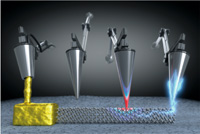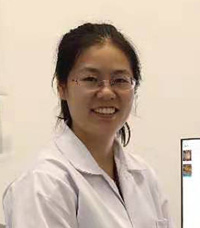Thursday, October 31, 2019
3:00-4:00pm (CST) Beijing
*Note: This webinar will be presented in Mandarin/中文

Conductive atomic force microscopy (CAFM) is one of the most powerful scanning probe microscopy (SPM) techniques, it can not only characterize the topography of specimen, but also analyze the local electronic properties of many dielectric materials and electronic devices.
CAFM technique has the capabilities to study many crucial nanoscale phenomena of thin dielectrics, such as the local defects, charge trapping and de-trapping, stress-induced leakage current, and negative-bias temperature instability. With the scaling of electronic devices and the reduction of dielectrics materials, the development of electronic characterization techniques at nanoscale becomes more and more important. This webinar will, firstly, introduce the history of CAFM technique, and its working principle, characteristics; then mainly describe its application in the electrical characterization of 2D materials and memristors. More specifically, this webinar will introduce: 1) Study the electrical properties of chemical vapor deposition hexagonal boron nitride (h-BN), including dielectric breakdown and electrical homogeneity; 2) Detect the resistive switching behaviors of h-BN based memristors and the features of conductive filaments; 3) How to achieve high-performance characterization techniques via the integration of CAFM with other setups. In the final part, a multiprobe SPA technique will be proposed and expected to achieve the in situ fabrication and characterization under high vacuum environment.

Speaker:
Fei Hui Ph.D
Fei Hui, Postdoctoral fellow at Technion-Israel Institute of Technology, Dr. Hui got her PhD degree in Nanoscience in 2018 at the University of Barcelona. During her PhD, she studied at Massachusetts Institute of Technology (MIT, USA) for 12 months and the University of Cambridge (UK) for 6 months. She has published over 38 research papers, 11 of them are as first author, including Nature Electronics, Advanced Functional Materials, ACS Applied Materials and Interfaces, 2D materials, Nanoscale. Moreover, Dr. Hui edited one book chapter on CAFM for Wiley-VCH, and applied for two international patents. She has been awarded 2019 Park AFM Scholarship, Mobility Grant of Royal Society of Chemistry. Her research interests focus on chemical vapor deposition of high-quality two-dimensional materials and the application in nanoelectronics.






